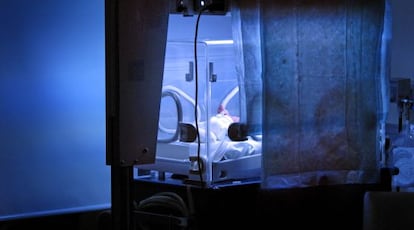Forty-two days to hand over a baby
The government wants to give mothers more time to confirm any decision to put a child up for adoption An average 350 newborns a year are turned over at birth


Over a third of the babies given up for adoption in Spain are turned over right after birth, at the hospital. Since 2008, the average has been 350 children a year, according to figures released by the Health and Social Services Ministry.
Now, the government is planning to produce a single nationwide protocol to determine how to proceed when women give birth to unwanted children. The executive wants to extend the current 30-day period women are given to confirm their decision to six weeks, in line with a European Union directive. Under the new system mothers will also no longer be under the obligation to record the birth at the Civil Registry — instead, authorities will do that for them.
Paula was born one morning in 1978 and that very same afternoon she was already with her new family, she explains. Paula is an assumed name because she wants to respect her parents' privacy. Her four parents, that is — the ones who raised her and the ones who brought her into this world. "Those were different times," she says.
But some things do not change. Like Paula, many babies are given up for adoption at the hospital - although the figure only represents 0.076 percent of the more than 450,000 children born last year; until now nobody had done the math.
In Spain, adoption requires a court ruling in most cases. In 2011, the courts issued 775 adoption authorizations. That same year, 3,262 families applied to adopt a child. There is no official data regarding waiting lists, but it will likely be years before these aspiring parents get their wish. Even though Spain has 30,000 wards of the state, many of them do not conform to the wishes of most couples, who would rather raise a small child.
The government is planning a single nationwide protocol to govern adoption
"Women who give up their children do so to give them access to something better," says one social worker who would rather remain anonymous. "I have always considered it a great act of love." She worked at a hospital for five years, assisting women who decided to give their babies up for adoption, and saw all kinds of backgrounds, "from drug addicts to young women without means, underage mothers and well-to-do girls under pressure from the people around them."
She lists the steps taken in each case. If the woman had given prior warning that she wanted to give up the baby, when she reached the emergency room "an alarm went off in the computers" to alert doctors to the fact. If she made the decision at the time of delivery, the social worker was called in for counseling. In any case, the hospital had to call the regional authorities, whose experts are in charge of handling the adoption process.
This year, the Health Ministry collected information from regional governments and from 40 hospitals, and found no common procedure when it came to the kind of information offered to women, whether they were allowed to see their newborn or not, or who decided its name. Some regions have protocols in place, others do not. In those that do, the documents are drawn up by the health centers themselves.
Now, as part of the Comprehensive Plan for Family Support 2014-2017, the ministry is set to initiate a round of talks with regional governments to work on a single protocol. "One of the problems we found is a lack of information," says Salomé Adroher, director general of family and children's services. "It is important for these women to know that Spain has a selection process for adoptive families and that both the children and themselves will be protected." That is the reason why the government is to extend the mother's one-month period to think over her decision.
"This is a very tough moment for these women. No matter how clear they are about it, they always have their doubts," says the social worker.
No matter how clear they are about it, they always have their doubts"
Adroher agrees about the distressing nature of the process, and criticizes the fact that mothers currently have to ratify their decision three times: once after giving birth, then 30 days after delivery, and again when the judge is about to award custody of the child to the adoptive parents. In theory, children should only spend six months in a foster home while the final adoptive family is found, but "the hearing can be delayed up to two years," says the director general. "With this reform, which will likely reach Congress in 2014, the woman's emotional wounds can start healing after six weeks, since she will no longer be required to be there in court."
Another measure in the works is aimed at protecting the mothers' privacy. Right now, her name and address show up in Civil Registry records. "There have been cases in which people close to the mother have found out that she had a baby and gave it up for adoption. Now she will no longer have to reveal her address, and never will she have to go to the Civil Registry to sign up the newborn. The authorities will do that," says Adroher.
But adopted children often end up wanting to know more about their roots, says Iratxe Serrano, president of La Voz de los Adoptados (The voice of the adopted), "the only Spanish association that offers counseling throughout this process." Serrano applauds the government's decision to let children, once they are of age, to access their biological mother's file. This way they will be able to find out where she turned for help and what her financial situation was. It will even be possible to read the letter that the mother wrote explaining the reasons for her decision.
Paula admits she would have loved to have had this option. She defines herself as "a survivor, just like all adoptees, who have to face the fact that they were abandoned." The first time she felt the need to learn something more about her past was at the age of 18, after her father's death.
"I found out too much. I got scared. I felt angry when I found out that my mother had rebuilt her life and I dropped the subject until the age of 33, when I wanted to have children of my own," Paula says. Two years have gone by since she took up the search again, but this time she hired an expert in conflict resolution. After five months of weekly therapy, she was able to establish a relationship with her biological parents and siblings. "I am lucky. What used to hurt me intensely years ago has now disappeared."
Tu suscripción se está usando en otro dispositivo
¿Quieres añadir otro usuario a tu suscripción?
Si continúas leyendo en este dispositivo, no se podrá leer en el otro.
FlechaTu suscripción se está usando en otro dispositivo y solo puedes acceder a EL PAÍS desde un dispositivo a la vez.
Si quieres compartir tu cuenta, cambia tu suscripción a la modalidad Premium, así podrás añadir otro usuario. Cada uno accederá con su propia cuenta de email, lo que os permitirá personalizar vuestra experiencia en EL PAÍS.
¿Tienes una suscripción de empresa? Accede aquí para contratar más cuentas.
En el caso de no saber quién está usando tu cuenta, te recomendamos cambiar tu contraseña aquí.
Si decides continuar compartiendo tu cuenta, este mensaje se mostrará en tu dispositivo y en el de la otra persona que está usando tu cuenta de forma indefinida, afectando a tu experiencia de lectura. Puedes consultar aquí los términos y condiciones de la suscripción digital.








































